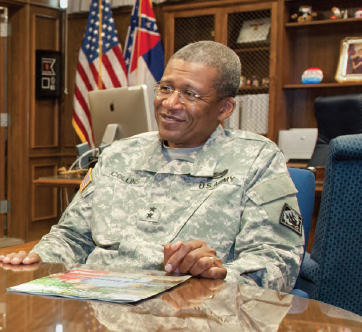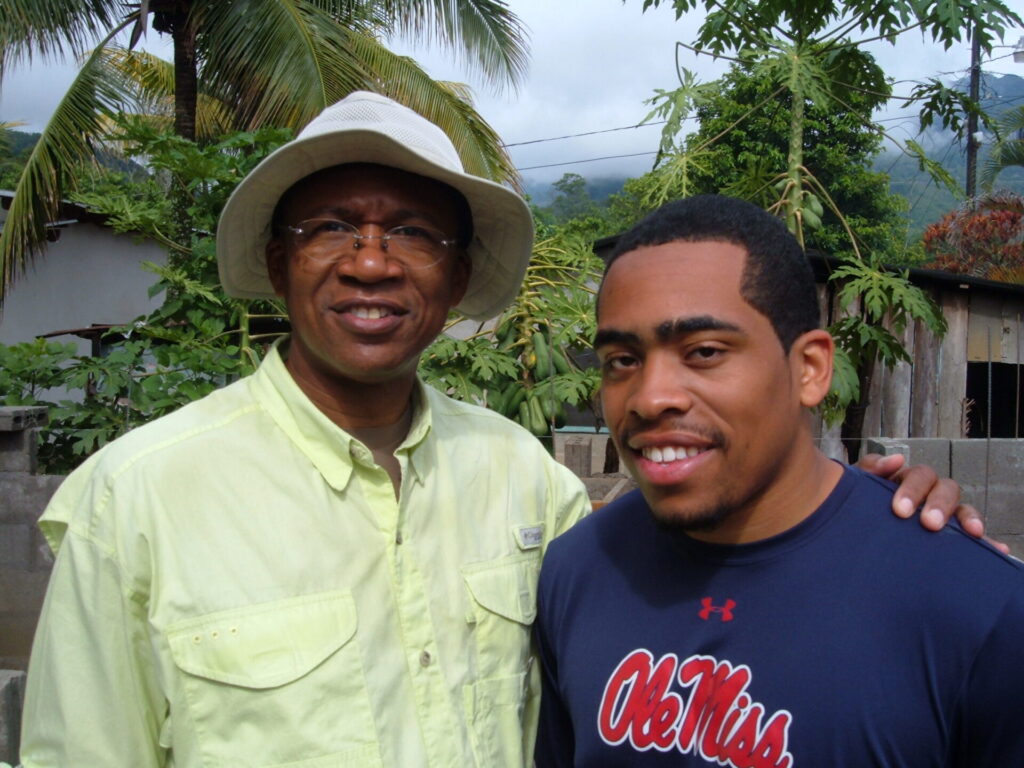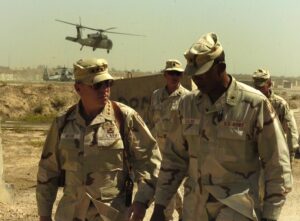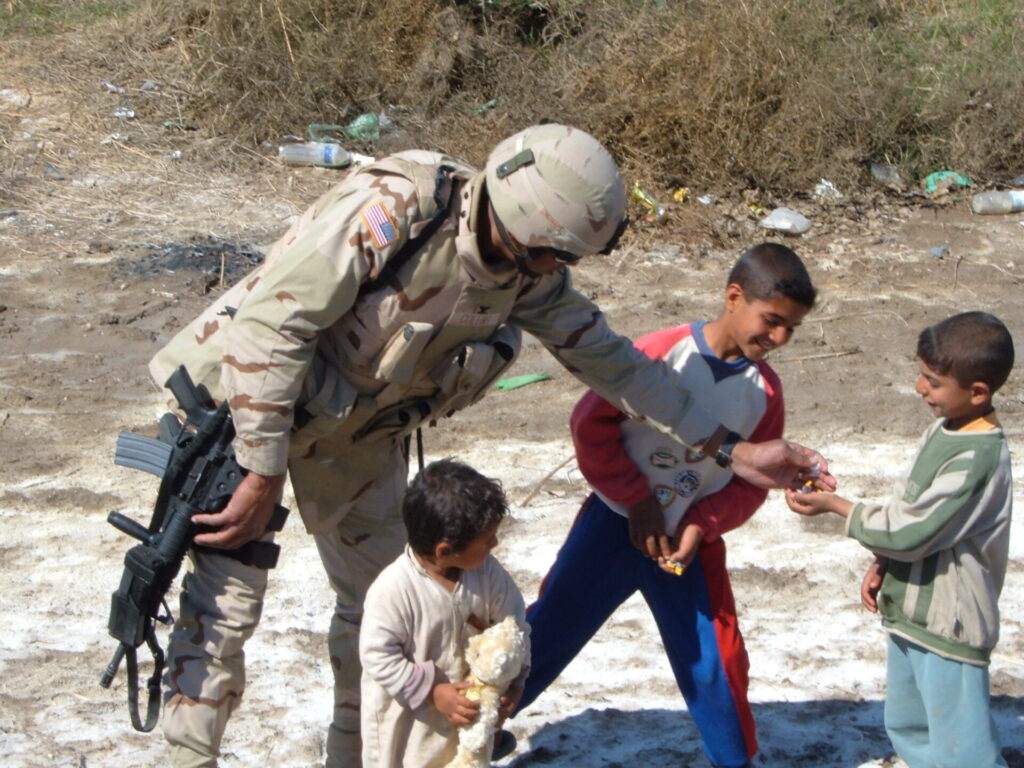As the Adjutant General of Mississippi, Major General Leon Collins bears the responsibility of commanding the Mississippi Army and Air National Guard. In that role, he is the head of Mississippi’s Military, and it is his duty to see that the 12,000+ Citizen Soldiers and Airmen are equipped and ready to do whatever they are called to do in any emergency—man-made or natural.
 Much could be made of the fact that he is the first African American to be appointed to this prestigious position, but that fact is completely irrelevant. He was chosen by Governor Phil Bryant in 2012, because he was, by far, the very best man for the job. General Collins represents everything that is good and right about the United States of America, and he is a courageous, decorated and battle-tested soldier.
Much could be made of the fact that he is the first African American to be appointed to this prestigious position, but that fact is completely irrelevant. He was chosen by Governor Phil Bryant in 2012, because he was, by far, the very best man for the job. General Collins represents everything that is good and right about the United States of America, and he is a courageous, decorated and battle-tested soldier.
Governor Bryant, reflecting on the day Collins officially took the reins of his office said, “General Leon Collins is without a doubt one of the finest leaders in Mississippi. His military capabilities are without question—in 2005, he commanded Mississippi’s largest mobilization since World War II, but it is his character that truly sets him apart. I remember the day Mrs. Collins and I pinned the General with his new rank. In front of the men and women he leads, he stood at the podium with his arms outstretched, recalling Christ’s sacrifice on the Cross, speaking openly and movingly about his faith. I am proud to serve with him and proud of the job he does in leading the men and women of the Mississippi National Guard and Air National Guard.”

The former Commander of the 155th Armored Brigade Combat Team from 2004 to 2006 spent 16 months in Iraq during Operation Iraqi Freedom. His daily duties included overseeing 4,500 soldiers who looked to him for orders, and, to a certain extent, the intangible sense that he was in this with them and they were all in it for a high and worthy purpose. He was about 7,000 miles away from his native Booneville, and even farther from anything he had ever imagined, on the day in 1977 when he signed on the dotted line and became a full-fledged member of the Mississippi National Guard.
At the time, the college benefits and the extra money seemed like the best reasons to join. The 19-year-old student at Northeast Community College (NECC) did have a passing thought or two about the on-the-job leadership training that would likely come in handy in a later career, but he had no idea that the military was going to become his career. In 1977, he was a full-time college student who was paying his way as a full-time bus driver for the Prentiss County schools. He knew he wanted to continue his education after NECC, and joining the Guard would definitely make that possible.
He went on to earn his Bachelor of Business Administration from Ole Miss and later his Master of Business Administration degree from Jackson State. Thirty-seven years later, however, he has no regrets that his path led to the military instead of the marketplace.
“I’ve been in the military now since 1977,” he says. “I’ve had the opportunity to visit a number of different countries. And not all of those countries had anything to do with war. But the military has given me the opportunity to see how people around the world live. Some of those places are nice, but, still, there is only one place that I want to live, and that is in the United States of America.”

Taking the Command
After a brief time working for the Mississippi Employment Security Commission, General Collins took a full-time post with the National Guard in 1988 as a deputy Inspector General. Part of his job description was to maintain a vigilant watch over the readiness of the troops. Each summer he went through his summer training, working on equipment and weapon systems, basically learning everything that might be necessary to know in times of combat. There was no guarantee that he would ever have to use his training, but he had always been one to work hard, and so he continued to push himself to master whatever was in front of him.
 He was promoted to the next rank each time he was eligible, and by the time 2004 arrived, he had achieved the rank of Brigadier General — a one-star level in the world of Generals. To this point, General Collins had served his entire career stateside, coming close to being deployed during Desert Storm, but then that war ended before his group was actually called.
He was promoted to the next rank each time he was eligible, and by the time 2004 arrived, he had achieved the rank of Brigadier General — a one-star level in the world of Generals. To this point, General Collins had served his entire career stateside, coming close to being deployed during Desert Storm, but then that war ended before his group was actually called.
He was taken aback altogether when General Harold Cross, Adjutant General in 2004, called him and told him that the 155th Brigade would be going to Iraq in the next few months. The soldiers had been mobilized in training at Camp Shelby for almost a month when a routine physical revealed a heart problem with then Commander Brigadier General Ben Gaston. That heart issue would prevent him from serving overseas. It was necessary to find a very quick replacement. General Collins was one of a very few whose credentials made him eligible for the position.
It is called being “asked” to do something in the military, but I’m not so sure “asked” is exactly an accurate word. General Collins accepted the appointment and was immediately the Commander of the active duty 155th Armored Brigade.
This assignment was huge. It was also overwhelming — 4,500 soldiers were looking to him for leadership. Here he was in the most significant assignment of his career getting a very late start at leading a mission that was critically important, not just for his soldiers, but also for the United States of America. The soldiers in this battalion had already had four weeks of training and preparation.
As Commander-come-lately, General Collins had to jump into his role as leader while at the same time going backward to also navigate and master every drill, requirement, and training course his men had already completed. And of course, he had to do it all with that calm sense of strength that everyone expects in their leader. In a day of 24 hours, he really needed about 12 more!
It was an email from his youngest son, Benjamin, that really settled him down and removed any doubts that the task was bigger than he was, but his help and salvation would come from God. Ben was just a seventh grader at the time when he sent his father a quote that someone had sent to him. It said, “If God brings you to it, He’ll bring you through it.”
General Collins had been praying, but he had also been struggling a lot in his own strength, worrying that he would not be up to the task. The Twenty-Third Psalm is his favorite scripture, and he had repeated its comforting words more times than he could count, but those words from his son’s email really grabbed his heart.

Collins loved time spent with the local
children, but there were more serious times
than he can even count.
“It was like a big weight was lifted off me that day. I felt like the Lord was speaking to me saying, ‘You know, you are worrying way too much about this. Just do what you’ve been trained to do. Let the training take over and leave the rest to me and everything is going to be all right.’”
There was a peace in the middle of the uncertainty from that point on. Every day was filled with lots of uncertainty, but Collins had an anchor that kept him steady in the middle of it all.
The Daily Grind of War in Iraq
General Collins had already spent 27 years in the National Guard when he deployed to Iraq. The entire discipline of military training had undergone a transformation during those years. Back in the 1970s and 1980s, strategy and application were geared toward a potential war with Russia. After the fall of the Soviet Union and the birth of Al Qaeda, the battlefield was different, and the enemy required a totally different brand of warfare. It was all completely new—and it was constantly changing.
As one of General Collins’ fellow officers told a reporter on the January afternoon in 2006 when the last of the 155th Brigade returned to Mississippi amid fanfare, lots of American flags, cheers, and tears, “It’s not a linear battlefield. It’s not us against them, and that [new warfare] is something these soldiers are constantly dealing with on a daily basis.”
As General Collins describes, “Death was just all around us. There is just no way our soldiers will ever forget some of the situations that we saw on the ground over there. I don’t know what makes someone handle it better than others…” Some of it, he says, is just worldview, an individual perspective on life.
But for General Collins who woke up every day for 16 months knowing he was in charge of 4,500 other soldiers, his strength came from God. “I just prayed every morning that the Lord would give me the ability to make good decisions that day so that we wouldn’t lose anybody that day and we would be able to accomplish the missions that had been given to us. And, you know, at the end of the day, I would thank Him we were able to make it through—usually unscathed. It’s a tremendous responsibility when you’ve got that many soldiers under your command because you can’t protect them all. So, you just work with your staff, come up with the best plans you can, and pray.”
 General Collins says, “This type of warfare that we were engaged in in Iraq was warfare where you couldn’t easily identify the enemy.
General Collins says, “This type of warfare that we were engaged in in Iraq was warfare where you couldn’t easily identify the enemy.
Americans, especially, could not identify them because there are no uniforms on the enemy. They dress like anybody else walking down the street. The local people could tell the difference. And in a lot of cases, we had the opportunity to develop close enough relationships with some of the local people to where they would tell us when there were new people in town who were probably part of the insurgency.”
General Collins’ men would go, take the individuals into custody, question them, and if they found any type of weapons, ignitions, or explosives, they had the authority to arrest the insurgents. Every day was different. Every day was dangerous.
There was a heightened sense of being on guard every second of every day. Never was there a moment when the word “safe” was appropriate. The focused training that occurs once a group is mobilized includes specific education called “Cultural Awareness.” The serious importance of understanding it all and remembering it all cannot be overemphasized. In a Middle Eastern country, ignoring one of their revered customs could yield dire consequences.
One of the biggest challenges for Collins was “wanting to get around and spend time with soldiers.” He was keenly aware that these 4,500 men under his command were flesh and blood individuals, who beyond being soldiers were also husbands, sons, fathers, friends, and their lives had great value.
At one point during the war, he had men in seven different operating locations spread across miles and miles. It was impossible, from a logistics standpoint, to get to every location in one day, or even in one week. Despite the difficulty, Collins thought it was more than important. He thought it imperative taking the words of General George Patton very seriously. Patton said that soldiers had a great need to see their leader and to know that he was there fighting with them.
So, General Collins would head out on a Tuesday, either driving in a convoy or possibly traveling by helicopter, visit an operation Tuesday afternoon, all day Wednesday, returning to his station on Thursday afternoon. The next week he would go through the same routine, but would travel to a different location. During those visits, Collins took part in the patrols, spent time with the locals, and did all he could to assure his men that he was just as close to the fray as each of them were. He was as much at risk for an Improvised Explosive Device (IED) to explode in his path as the next man or woman.
Losing a soldier was by far the most devastating aspect of war, and you never get used to it. As General Collins says, “Nothing shocks you to reality of war more than losing a soldier. We had only taken command of the area about four or five days before when we had our first casualty. It was definitely a wake-up call that, okay, you guys are at war now.”
General Collins can recite the name and hometown of that soldier even now a decade later. In total, during those 16 months, there were 27 men of the 155th Brigade who lost their lives. Every fallen soldier was a gut-wrenching loss, as well as an American hero.
And when the 155th Brigade returned in 2006, they felt so proud of what they had accomplished. They left behind a stabilized region in Southern Iraq. There was a lot of pride for the mission and a lot of hope for the Iraqi people and their future.
During the violence in recent weeks, Collins has watched the news reports with a great personal interest. He does feel invested in the outcome. At the time of our interview, the fighting was still north of Baghdad, and the region he had commanded was still south of the greatest conflict. “But once it gets south of Baghdad, that will be in the area where the 155th was,” he says.
He admits he has thought a lot in recent days about the locals who welcomed the American presence. He remembers, especially, the children who loved to talk to the soldiers, who begged for candy, and who were so grateful for the attention and the affection of the Americans. He wonders how they are faring amid the violence. “The people there are so different. Someone can walk into a crowd with a suicide bomb and just blow people up.You never know who is involved in it, and they sometimes kill scores of people — young children, too — all at one time.”
The hardest thing to wrap one’s mind around is that the suicide bombers do such things voluntarily — proudly believing while killing others they are dying for such a worthy cause and that Allah is pleased.
The Ties That Bind
One distinction of troops in wartime is the bond forged among them — perhaps the strongest of all bonds and the most enduring. Soldiers who have served together are members of a select fraternity, and though, if truth be told, few would have gone looking for such drama, there is a depth of devotion to one another that is only born during the unique period of shared danger.
General Collins says, “Once you go serve, just serving with someone creates a bond. But to serve with someone in combat creates an altogether different type of bond.”
He describes what it is like even these eight years post-combat when he runs into a soldier whose right shoulder patch indicates that he was a member of the 155th Brigade. There is a real kinship between them as General Collins says, “I know that’s one of my guys.”
Today, sitting behind his desk in his office at the Mississippi National Guard complex in Jackson, he can look around the paneled walls covered with awards, newspaper clippings, family pictures, personal memorabilia, and be proud of the past three decades. Everything the eye can see reveals the things that matter to him — faith, family, country, integrity, and courage — good things. His is a story of a very good soldier and a very fine American.
– Mississippi Christian Living magazine, July 2014
Recent Comments